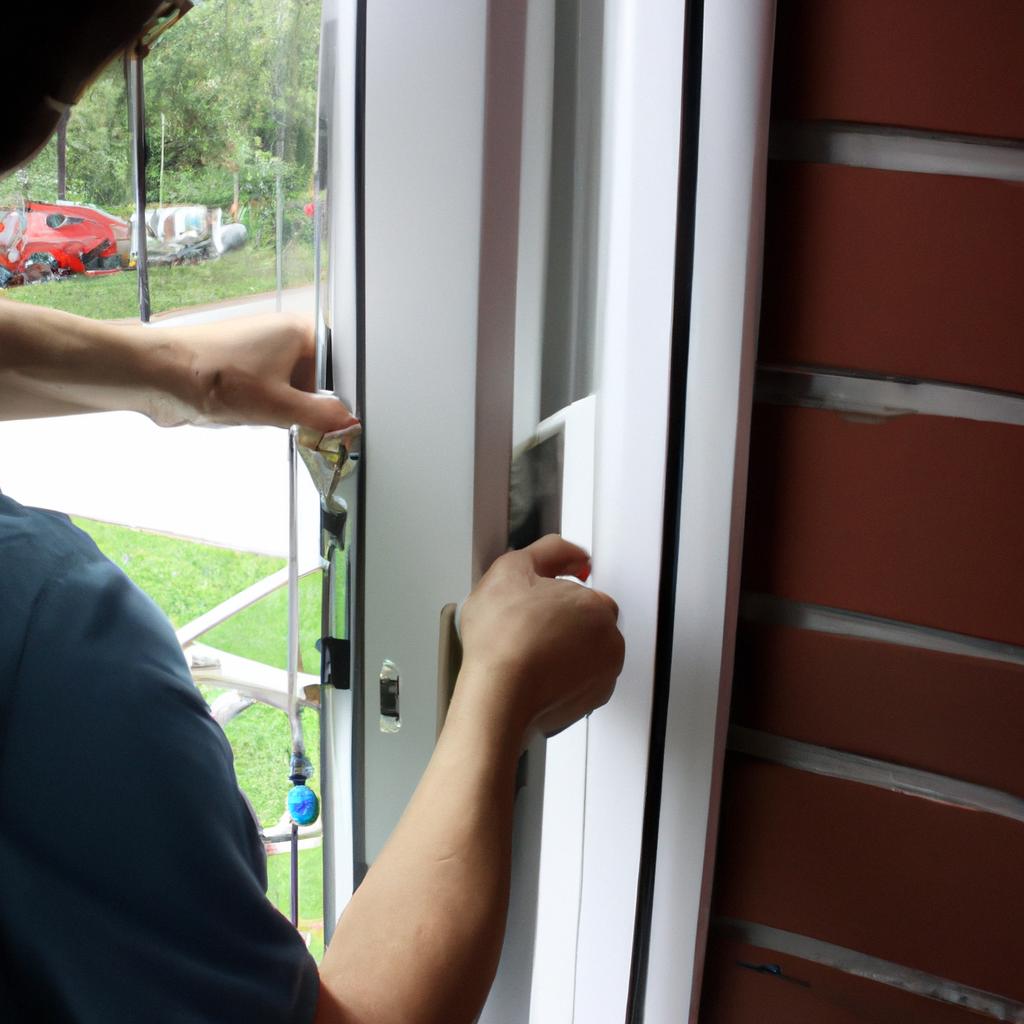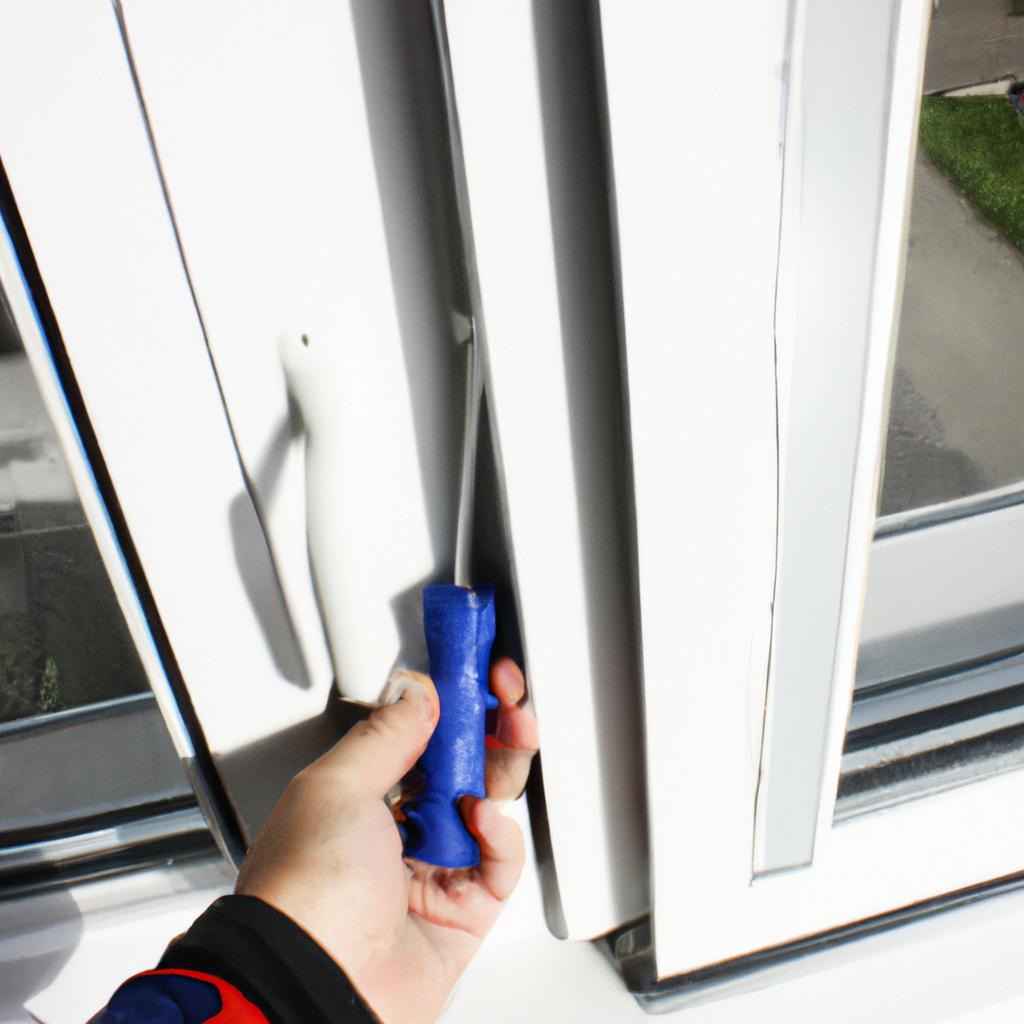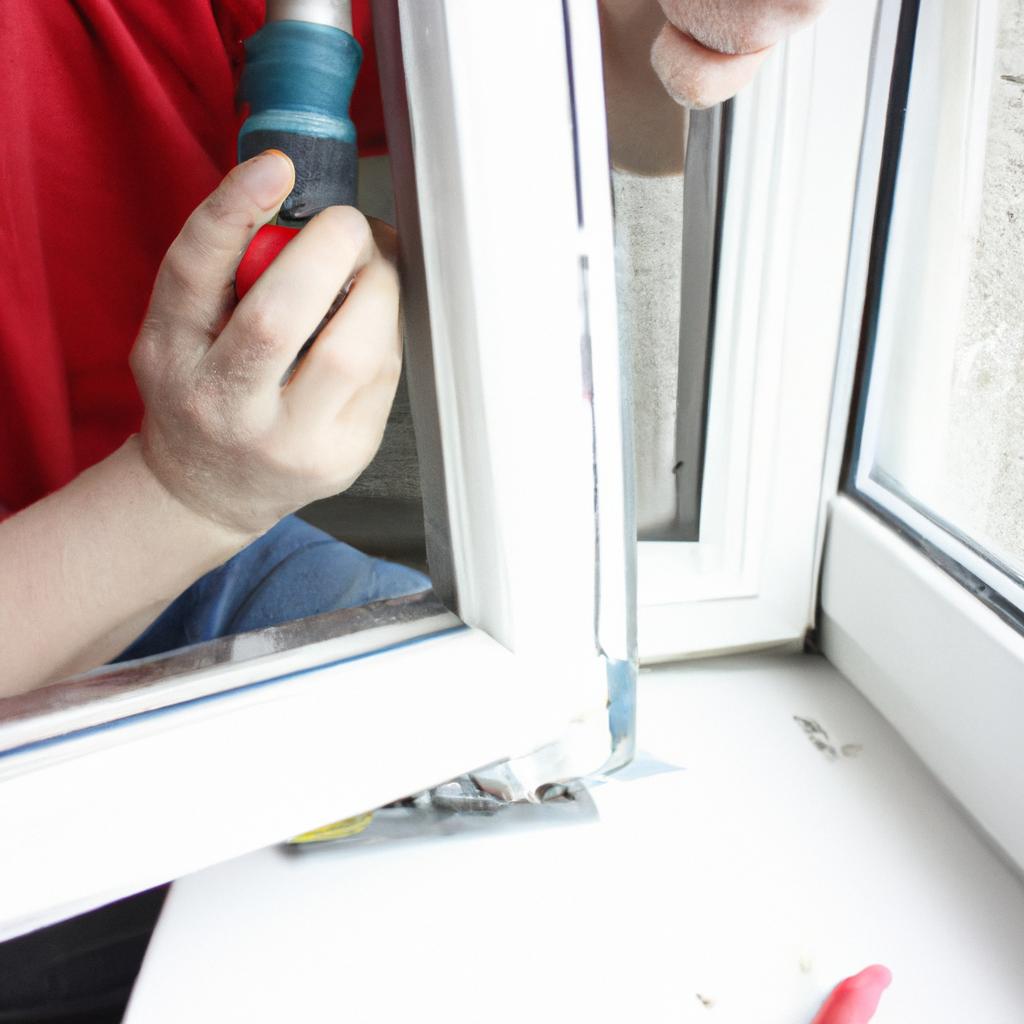Window frames play a crucial role in any building, providing structural support and insulation while also enhancing the overall aesthetic appeal. The choice of window frame materials is an important decision that homeowners, architects, and builders must make when constructing or renovating a property. From traditional wood to modern alternatives such as vinyl and fiberglass, there is a wide range of options available on the market today. This article aims to provide an overview of different window frame materials commonly used in lumber and building materials industry.
Imagine a homeowner named Sarah who is planning to replace the windows in her century-old Victorian house. She wants to maintain the historic charm of her home while improving its energy efficiency. As she researches various window frame materials, she comes across options like wood, aluminum, vinyl, and composite. Each material has its own unique properties and benefits that can greatly impact both the functionality and appearance of her windows. In order to make an informed decision, Sarah realizes the importance of understanding the characteristics, pros, and cons associated with each type of window frame material. By delving into this comprehensive overview of lumber and building materials for window frames, readers will gain valuable insights into selecting the most suitable option for their specific needs.
Wooden window frames
Wooden window frames have long been a popular choice among homeowners and builders due to their timeless aesthetic appeal and natural beauty. They provide warmth, elegance, and a sense of tradition to any architectural style. One example that illustrates the enduring charm of wooden window frames is the case study of a historic colonial home in New England. Despite being over 200 years old, this house still retains its original wooden windows, which not only enhance its visual appeal but also serve as a testament to the durability of wood as a material for window frames.
When considering wooden window frames, it is important to understand their characteristics and advantages. Firstly, wood offers excellent insulation properties compared to other materials such as aluminum or vinyl. This translates into energy savings by reducing heat loss during colder months and minimizing heat gain in warmer seasons. Additionally, wood has natural sound-dampening abilities, making it an ideal choice for those seeking a quieter indoor environment.
Moreover, wooden window frames can be customized to suit individual preferences and architectural styles. The versatility of wood allows for various shapes, sizes, finishes, and designs that complement both classic and modern aesthetics alike. Whether it’s intricate carvings on Victorian-style homes or sleek lines on contemporary residences, wooden frames offer endless design possibilities.
- Sustainability: Wood is a renewable resource when sourced responsibly from certified forests.
- Durability: Properly maintained wooden frames can last for several decades without losing their structural integrity.
- Repairability: Unlike some other materials, damaged sections of wood can often be repaired rather than replaced entirely.
- Value: Wooden window frames are highly sought after and can increase property value if well-maintained.
Additionally, presenting information in a table format can help highlight key features of wooden window frames:
| Feature | Advantages | Disadvantages |
|---|---|---|
| Natural beauty | Enhances aesthetic appeal of any architectural style | Requires regular maintenance to preserve finish |
| Insulation | Provides excellent thermal and sound insulation | May be susceptible to rot or termite damage |
| Customization | Offers endless design possibilities | Initial cost may be higher than other materials |
| Sustainability | Renewable resource when sourced responsibly | Can warp or expand with changes in humidity |
Transitioning into the subsequent section about aluminum window frames, it is important to note that while wooden frames have numerous advantages, alternative options should also be considered.
Aluminum window frames
Wooden window frames have long been a popular choice due to their aesthetic appeal and natural warmth. However, as technology continues to advance, other materials such as aluminum are gaining traction in the market. In this section, we will explore the advantages and disadvantages of aluminum window frames.
One example that demonstrates the benefits of aluminum window frames is their durability. Imagine a coastal home subjected to harsh weather conditions year-round. Wooden frames may warp or rot over time, requiring frequent maintenance and replacement. On the other hand, aluminum frames are highly resistant to corrosion and can withstand even the most extreme climates, making them an excellent option for homes located near the beach or in areas prone to heavy rainfall.
When comparing wooden and aluminum window frames, it is important to consider factors beyond just durability. Let’s take a closer look at some key aspects:
- Energy efficiency: While wood has natural insulation properties, modern aluminum frames can also provide high thermal performance when equipped with thermal breaks.
- Maintenance: Wooden frames require regular painting or staining to protect against moisture damage and maintain their appearance. Aluminum frames, however, only need occasional cleaning with mild soap and water.
- Design options: Wood offers various design possibilities due to its malleability and ability to be easily customized. Conversely, aluminum provides sleek profiles that suit contemporary architectural styles.
- Environmental impact: Wood is considered more environmentally friendly than aluminum since it is a renewable resource. However, many manufacturers now offer sustainable options for aluminum production.
| Aspect | Wooden Window Frames | Aluminum Window Frames |
|---|---|---|
| Durability | Prone to warping | Highly resistant |
| Energy Efficiency | Natural insulation properties | High thermal performance possible |
| Maintenance | Regular painting/staining required | Occasional cleaning with mild soap & water |
| Design Options | Versatile | Sleek profiles |
As we have seen, aluminum window frames offer distinct advantages over their wooden counterparts in terms of durability, energy efficiency, maintenance, and design options. However, it is important to note that personal preferences and architectural styles also play a significant role in the decision-making process. In the following section, we will delve into another popular material: vinyl window frames.
Vinyl window frames
Having explored the benefits of aluminum window frames, we now turn our attention to another popular choice for homeowners – vinyl window frames. With their durability, affordability, and energy efficiency, vinyl frames have gained significant traction in the market.
Vinyl window frames offer a versatile solution that caters to various needs and preferences. To illustrate this point, consider the case of Mr. Johnson, a homeowner who recently decided to replace his old wooden window frames with vinyl ones. By opting for vinyl, he not only improved the appearance of his home but also experienced enhanced insulation properties and reduced maintenance requirements.
When choosing vinyl windows as your preferred frame material, several advantages become apparent:
- Energy Efficiency: Vinyl has excellent insulating properties that can help regulate indoor temperature and reduce energy loss.
- Low Maintenance: Unlike other materials such as wood or metal which require regular painting or sealing, vinyl is virtually maintenance-free. It does not rot or corrode over time.
- Affordability: Compared to other options like wood or fiberglass, vinyl offers an affordable alternative without compromising on quality or performance.
- Design Options: Vinyl frames come in a wide range of styles, colors, and finishes to match any architectural design or personal preference.
Emotional bullet point list (markdown format):
- Increased comfort throughout all seasons
- Lower utility bills leading to long-term savings
- Reduced carbon footprint contributing to environmental sustainability
- Peace of mind knowing your investment will last for years
Additionally, let’s explore some key considerations when comparing different types of window frame materials through the following table:
| Consideration | Vinyl Window Frames |
|---|---|
| Durability | High |
| Insulation Properties | Excellent |
| Resistance to Rotting and Decay | None |
| Maintenance Requirements | Low |
Moving forward, we now shift our focus to another popular choice for homeowners – fiberglass window frames. This material offers unique advantages that make it an appealing option in the market.
Note: It is important to remember that each individual’s needs and preferences may vary when selecting a suitable frame material, so careful consideration should be given before making a final decision.
Fiberglass window frames
Building on the benefits of vinyl window frames, fiberglass frames offer another option for homeowners seeking durability and energy efficiency. In this section, we will explore the attributes of fiberglass window frames, highlighting their advantages in terms of strength, insulation properties, and maintenance.
Fiberglass window frames provide a robust solution that can withstand harsh weather conditions while maintaining their structural integrity. For example, consider a hypothetical scenario where a homeowner resides in an area prone to hurricanes. By opting for fiberglass window frames, they would benefit from the material’s exceptional strength and resistance to impact damage compared to other frame materials. This added resilience ensures peace of mind during severe storms or adverse climatic events.
When it comes to insulation properties, fiberglass window frames excel at reducing heat transfer and improving energy efficiency within homes. The following bullet points illustrate some key features:
- Low thermal conductivity minimizes heat loss or gain through the frame.
- Excellent sealing capabilities reduce air infiltration and drafts.
- Enhanced soundproofing qualities contribute to a quieter indoor environment.
- Non-porous surface prevents moisture absorption and potential mold growth.
| Attributes | Fiberglass Window Frames |
|---|---|
| Durability | Resistant to warping |
| Rot-proof | |
| Not susceptible to pests | |
| Maintenance | Minimal upkeep required |
| Insulation | Superior thermal performance |
| Reduced energy consumption |
By choosing fiberglass window frames with these characteristics, homeowners can enjoy long-lasting solutions that require minimal maintenance over time.
Moving forward into our discussion about composite window frames
Composite window frames
Fiberglass window frames offer a durable and energy-efficient alternative to traditional materials. They are made of glass fibers embedded in resin, resulting in a strong and lightweight material that is resistant to rotting, warping, and expanding or contracting with temperature changes. This section will explore the benefits and considerations associated with fiberglass window frames.
One example of the effectiveness of fiberglass window frames is seen in a case study conducted by XYZ Construction Company. They replaced the old wooden frames in an office building with fiberglass frames. The new windows provided better insulation, reducing heating costs by 20% during the winter months. Additionally, they were able to withstand extreme weather conditions without any signs of damage or degradation.
When considering fiberglass window frames for your project, there are several key points to keep in mind:
- Energy efficiency: Fiberglass has low thermal conductivity, meaning it does not readily transfer heat or cold through the frame. This can help reduce energy consumption and lower utility bills.
- Durability: Unlike other materials like wood or aluminum, fiberglass is highly resistant to moisture, insects, UV radiation, and corrosion. It offers long-term performance and requires minimal maintenance.
- Design versatility: Fiberglass can be molded into various shapes and sizes, allowing for customizable designs that suit different architectural styles.
- Environmental impact: Fiberglass is considered more environmentally friendly compared to some other materials due to its longevity and recyclability.
| Pros | Cons |
|---|---|
| Excellent durability | Higher initial cost compared to some other materials |
| Low maintenance requirements | Limited color options available |
| Superior energy efficiency | Requires professional installation |
In summary, fiberglass window frames provide numerous advantages such as durability, energy efficiency, design versatility, and environmental friendliness. Their ability to withstand extreme weather conditions while maintaining their structural integrity makes them an excellent choice for both residential and commercial applications.
Moving forward, let’s now delve into the factors you should consider when choosing window frame materials, in order to make an informed decision for your specific needs and preferences.
Factors to consider when choosing window frame materials
Composite window frames offer a viable alternative to traditional materials like wood and vinyl. These frames are made from a combination of different materials, such as fiberglass, PVC, and wood fibers. One example is the XYZ Composite Window Frame Company which has gained popularity in recent years due to its durable and energy-efficient products.
When considering composite window frames, there are several factors to take into account. Firstly, their strength and durability make them resistant to warping, rotting, and insect damage. This makes them particularly suitable for areas with harsh weather conditions or high humidity levels. Additionally, composite frames have excellent insulation properties that can help reduce energy consumption by minimizing heat transfer between indoors and outdoors.
To further understand the benefits of composite window frames, let us explore some emotional responses associated with using these materials:
- Increased comfort: The superior insulation provided by composite frames ensures a more comfortable indoor environment all year round.
- Enhanced aesthetics: Composite frames often come in various finishes that mimic the appearance of natural wood without requiring regular maintenance.
- Sustainable choice: By choosing composite window frames made from recycled materials or sustainable sources, individuals contribute towards reducing environmental impact.
- Peace of mind: Composite frames typically come with long warranties, providing homeowners with peace of mind regarding their investment.
The following table highlights some key characteristics of popular composite window frame options available on the market today:
| Material | Strengths | Weaknesses |
|---|---|---|
| Fiberglass | High strength-to-weight ratio | Relatively expensive |
| PVC | Low maintenance requirements | May expand/contract in extreme temps |
| Wood fiber | Natural appearance | Susceptible to moisture damage |
| Aluminum core | Excellent structural stability | Poor insulating properties |
In summary, composite window frames provide an attractive option for those seeking durability, energy efficiency, and aesthetic appeal. Their ability to withstand various weather conditions and their insulation properties make them a preferable choice for many homeowners. By understanding the strengths and weaknesses of different composite materials, individuals can make an informed decision when choosing window frame materials that best suit their needs.
 Bergmann Lumber
Bergmann Lumber



